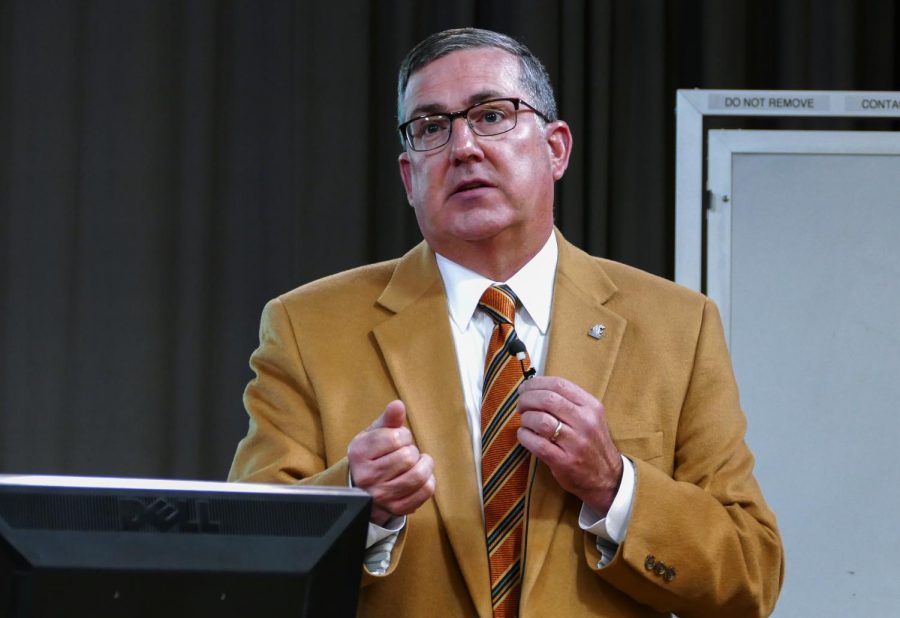Schulz talks fiscal health with Faculty Senate
University is $22 million positive in revenue, expenses
STEPHEN MURNANE | THE DAILY EVERGREEN
WSU President Kirk Schulz speaks at the WSU Faculty Senate meeting about the university’s fiscal health and how the administration plans to work with the faculty Thursday in the Food Science and Human Nutrition building.
October 5, 2018
President Kirk Schulz provided an update of WSU’s fiscal health and enrollment growth while being met with constituent questions and concerns Thursday at the Faculty Senate meeting.
Schulz referred to the 2.5 percent spending cuts last year to aid the $30 million deficit and said the university made a significant process in restoring the fiscal health since then.
WSU essentially made a $22 million dollar positive difference in revenues and expenditures from last year, he said.
“A lot of people really rolled up their sleeves,” Schulz said.
The fiscal health committee will be working on a draft proposal that will be publicized and will be open for dialogue and discussion. The proposal will contain a policy that requires colleges to set aside reserve funds for major purposes or initiatives, he said.
“Trust me, nobody likes working under this kind of fiscally-constrained environment,” Schulz said.
WSU is also looking to increase the student population across all campuses as a whole to about 40,000 by 2028.
“If you look at the state of Washington demographics,” he said, “they estimate that the state will grow by a million people in the next decade.”
As a result, a lot of students will be looking for public higher education. Institutions in Washington would need to grow to accommodate the budding population, he said.
Michael Cleveland, senator for the College of Agricultural, Human and Natural Resource Sciences, posed a constituent concern about having a detailed breakdown of apparent growth in administrative positions.
“In the spirit of fiscal health and transparency,” Cleveland said, “it would be important to our WSU community to know the growth in each of these positions separately over the past couple years.”
Schulz agreed and said they will provide a detailed breakdown on the fiscal health website.
Matthew Carroll, School of the Environment representative, asked if there could be a faculty representative voice present during the “legislative ask,” which is when the university decides questions to bring up to the legislative.
“One role that the faculty had never had is a place at the table with the president,” Carroll said. “[It’s] usually a very tightly-held secret until it’s released.”
Schulz said they are open to including a faculty voice during legislative asks in the future.
JoAnn Dotson, College of Nursing senator at large, voiced an ongoing concern about ensuring the consistency of resources and availability of tutors for students.
“There are going to be some of our campuses that have more resources than others,” Schulz said. “The question is, how do we make those resources available system-wide?”






















